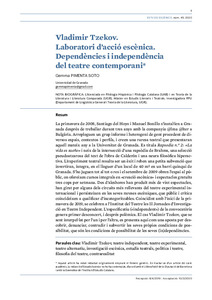Vladimir Tzekov. Laboratory of Stage Action. Dependencies and Independence of Contemporary Theatre
Metadata
Show full item record
Estudis escènics: quaderns de l'Institut del Teatre. 2020, Núm. 45
Document typeArticle
Abstract
<p>In spring 2008, Santiago del Hoyo and Manuel Bonillo settled in Granada after having worked for three years with the company @lma @lter in Bulgaria. They brought together an unstructured and heterogeneous group of people with different backgrounds, contexts and profiles, and created a theatrical rarity that they introduced at the Universidad de Granada that same year. It was entitled <em>Rapsodia n.º 2: “La vida es sueño” </em>and was born of the intersection of a Brahms rhapsody, a pseudo-random selection of the text of Calderon's play, and an overactive philosophical obsession. The theatrical experiment was a success, and they received a small grant that they fully invested in renting premises of 40 m² in a deprived neighbourhood in Granada. In September 2009 they boldly opened the venue to the public, where they offer comprehensive courses in "stage creation" and free shows three times a week. Since then they have produced more than twenty shows, toured some of the most important international experimental theatre circuits, and continue with their stage rarities, which critics and audiences alike regard as unclassifiable. Coinciding with the beginning of spring 2019, the 2nd Research Conference on Independent Theatre was held at the Institut del Teatre. The specification ("independent") of the call first caused bewilderment, and then controversy. The Vladimir Tzekov case, which feels challenged by both, is presented here as a bid to discover, denounce, contradict and subvert its own conditions of possibility, which are the conditions of possibility of its (in)dependencies.</p> <p>La primavera de 2008, Santiago del Hoyo i Manuel Bonillo s’instal·len a Granada després de treballar durant tres anys amb la companyia @lma @lter a Bulgària. Arrepleguen un grup informe i heterogeni de gent procedent de diversos espais, contextos i perfils, i creen una raresa teatral que presentaran aquell mateix any a la Universitat de Granada. Es titula <em>Rapsodia n.º 2: «La vida es sueño» </em>i neix de la intersecció d’una rapsòdia de Brahms, una selecció pseudoatzarosa del text de l’obra de Calderón i una neura filosòfica hiperactiva. L’experiment teatral resulta ser un èxit i reben una petita subvenció que invertiran, íntegra, en el lloguer d’un local de 40 m² en un barri quinqui de Granada. S’ho juguen tot al tot o res i el setembre de 2009 obren l’espai al públic, on ofereixen cursos integrals en «creació escènica» i espectacles gratuïts tres cops per setmana. Des d’aleshores han produït més de vint espectacles, han girat per alguns dels circuits més rellevants del teatre experimental internacional i persisteixen en les seves rareses escèniques, que públic i crítica coincideixen a qualificar d’incategoritzables. Coincidint amb l’inici de la primavera de 2019, se celebren a l’Institut del Teatre les II Jornades d’Investigació en Teatre Independent. L’especificatiu («independent») de la convocatòria genera primer desconcert, i després polèmica. El cas Vladimir Tzekov, que se sent interpel·lat per l’un i per l’altra, es presenta aquí com una aposta per descobrir, denunciar, contradir i subvertir les seves pròpies condicions de possibilitat, que són les condicions de possibilitat de les seves (in)dependències.</p>
Access conditionsOpen Access
ISSN2385-362X
,
0212-3819
Collections
- 2020: Núm.: 45 [11]


